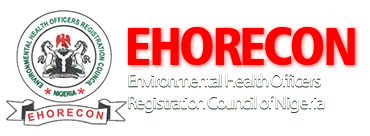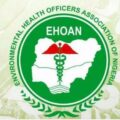Environmental health is the branch of public health concerned with all aspects of the natural and built environment affecting human health. Environmental health focuses on the natural and built environments for the benefit of human health.
Environmental health consists of 3 categories: health impacts, air quality, and water and sanitation. The health impacts category includes the environmental risk exposure indicator.
What is a public health license?
A license is required for Health Officers or Registered Environmental Health Specialists employed by health departments. It is a mandatory requirement for all public health officers who intend to work in government establishments in Nigeria excluding (Academics).
An environmental health professional or specialist is a practitioner with appropriate academic education and training and registration or certification to
- investigate, sample, measure, and assess hazardous environmental agents in various environmental media and settings;
- recommend and apply protective interventions that control hazards to health;
- develop, promote, and enforce guidelines, policies, laws, and regulations;
- develop and provide health communications and educational materials;
- manage and lead environmental health units within organizations;
- perform systems analysis;
- engage community members to understand, address, and resolve problems;
- review construction and land use plans and make recommendations;
- interpret research utilizing science and evidence to understand the relationship between health and environment; and
- interpret data and prepare technical summaries and reports.
The Licensure of Persons for Public Health Positions sets forth the license standards. In Nigeria, this is carried out by the Environmental Health Officers Registration Council of Nigeria (EHORECON) through the enactment of the Environmental Health Officers (Registration, etc) Act 11 of 2002.
The Act established the Council charged with the responsibility of regulating the Environmental Health profession in Nigeria. The specific objectives of the Council include:
Determining what standards of knowledge and skill are to be attained by persons seeking to become members of the profession of Environmental Health and improving those standards from time to time as circumstances may permit;
See: List Of Environmental Agencies In Nigeria
Securing in accordance with the provisions of the Act the establishment and maintenance of a register of persons registered under the Act as members of the profession and the publication from time to time of lists of those persons ;
Conducting examinations in the profession and awarding certificates or diplomas to successful candidates as appropriate and for such purpose, the Council shall prescribe fees to be paid in respect thereof, and performing the other functions conferred on the council by the act.
Duties of environmental health officers
Environmental health officers are responsible for monitoring and enforcing health and hygiene legislation. They also investigate when there’s an incident, such as pollution, noise problem, toxic contamination, pest infestation, or an outbreak of food poisoning.
They’re likely to spend time in the community they serve inspecting premises, collecting evidence from incidents, and providing advice.
Other responsibilities include:
- advising employers about matters of environmental health
- compiling reports
- delivering training
- investigating complaints – eg of pests or food poisoning
- serving legal notices
- providing evidence in court
- liaising with other organizations.
There are usually opportunities for promotion, as there is a structured career path for employees with local authorities.
Typical employers of environmental health officers
- Local authorities
- Oil companies
- Consultancies
- The Armed Forces
- Commercial cleaning organizations
- Supermarkets and large food retailers
PROCEDURE FOR REGISTRATION OF PERSONS TRAINED ABROAD AND THOSE HOLDING QUALIFICATIONS ALLIED TO ENVIRONMENTAL HEALTH.
Environmental Health Officers (Registration, etc) Act 11 of 2002 established the Council to regulate the environmental health professions in Nigeria. In pursuance of Sections, 1(a), 10, and 12 (2&3) of the Act, and following a special Council Resolution, Council has approved that persons holding the following qualifications listed below are to be admitted into the profession as Environmental Health Officers in Nigeria.
Persons with Ph.D. degrees.
Persons holding the above qualification and holding a first degree in such areas as Chemistry,
Biochemistry, Biological Sciences, Environmental Management, Public Health, and Health Promotion & Education, Food Science Technology; shall apply for registration with the Council to become Environmental Health Officers.
Step 1: The application shall be accompanied by copies of their credential and CVs detailing activities and experiences in the various areas of environmental health practice they have been involved in which they think to qualify them for admission into the profession.
Step 2: Upon acceptance, this category of persons would be required to attend a one-week mandatory intensive orientation/induction workshop where they would interact with other Environmental Health Officers.
Step 3: After this exercise, they would be admitted into the profession. The applicants would be required to obtain an application form with two thousand Naira (N2,000.00) and a registration fee of forty thousand (N40,000.00) Naira will be paid if admitted.
Persons with First Degree and Masters Degrees in Environmental Health Science from either a Nigerian University or an Overseas University before 2004.
Step 1: Persons who qualified with BSc, MSc, or MPH in Environmental Health will apply for registration attaching copies of their Credentials and CVs.
Step 2: On acceptance, this category of persons would be required to attend a one-week mandatory intensive orientation/induction workshop where they would interact with other Environmental Health Officers. After this exercise, they would be admitted into the profession.
Step 3: A non-refundable application fee of two thousand Naira (N2,000.00) and a registration fee of twenty-five thousand (N25,000.00) Naira will be paid by this category of persons.
Persons who qualified with BSc, MSc, or MPH in Environmental Health will apply for registration attaching copies of their Credentials and CVs. Upon acceptance, this category of persons would be required to attend a one-week mandatory intensive orientation/induction workshop where they would interact with other Environmental Health Officers. After this exercise, they would be admitted into the profession.
A non-refundable application fee of two thousand Naira (N2,000.00) and a registration fee of twenty-five thousand (N25,000.00) Naira will be paid by this category of persons.
Persons with First Degree and Master’s Degrees in other Environmental Health-Related Fields.
Step 1: Persons holding the above qualifications in such areas as Chemistry, Biochemistry, Biological Sciences, Food Science and Technology, Environmental Management, Environmental Science and Technology, Health Promotion & Education, who graduated before 2004 would register and take tutorials with accredited Learning Centres for a minimum of 6 and maximum of 18 months.
Step 2: The learning centers will present such candidates for the annual certification examinations of the Council from November 2008. Thereafter, if such a candidate is successful in the examination, he shall be registered. Successful applicants will be required to pay a non-refundable application fee of two thousand Naira (N2,000.00) and a registration fee of ten thousand (N10,000.00) Naira.
Persons who hold First Degree obtained after 2004.
Step 1: Persons holding qualifications in such areas as Chemistry, Biochemistry, Biological Sciences, Food Science and Technology, Environmental Management, Health Promotion & Education, Public Health, and Environmental Technology who graduated after 2004 and seeking to become Environmental Health Officers (except programs accredited by the Council) will be required to enroll and study for the PGD in Environmental Health in institutions accredited by the Council.
Step 2: Thereafter, they will be required to register and take the Council’s Certification Examinations. If such candidates are successful in the examination, they shall be registered as Environmental Health Officers. Their application and registration fees shall be at the prevailing rate for new entrants into the profession.
Notwithstanding, the above procedure for admission of persons into the profession, the Council
reserves the right to reject any application. Visit: https://ehoreconportal.org.ng/ for further details





